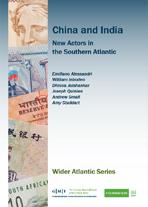China and India: New Actors in the Southern Atlantic
This policy paper examines the role of China and India in Latin America and Africa, and the implications for the United States and Europe.
China and India have arrived as active players in the Southern Atlantic space. Their economic presence is expanding rapidly, with a focus on their acquisition of — and access to — raw materials such as fossil fuels, minerals, and agricultural commodities. The political and security implications of their arrival in the region is only now coming under scrutiny. Certainly, traditional powers in North America and Europe continue to wield considerable influence in the Atlantic Basin, and the region remains a low foreign policy priority for both China and India. But for the first time, states in the Southern Atlantic are beginning to have concerns about the effects of China’s presence in particular — particularly a sense of overdependence on its economy and unbalanced trade relations — while remaining appreciative of its role as an alternative engine of growth to the West.
Overall, the rapid growth of the Chinese and Indian economies has produced a new dimension of South-South economic cooperation, which has also been assisted by deeper linkages between Africa and Latin America. Chinese and Indian firms have become more global, and both countries are no longer just trade players, but are also increasingly active in the global economy via foreign direct investment. Their investments are more diverse than is widely appreciated. There are important differences. China’s investment is more government-led and geostrategic, while India’s is led by publicly listed companies including its leading multinationals. Indian investment is also driven more toward manufacturing and services than China’s, which tends to be focused on natural resources and energy. China is also a major loan provider to both Africa and Latin America. Such engagement has produced real benefits for Africa and Latin America, including increased access to natural resources, improvements to physical infrastructure, and overall economic development. But concerns surface around the effects on environmental sustainability, labor standards, and local competitiveness.
These larger trends have several implications for the transatlantic community. China and India remain competitors as much as partners in the regions, and both lag behind the United States and Europe in terms of their overall presence. Africa has been a greater beneficiary of their engagement than Latin America. And overall, the arrival of China — and to a lesser degree, India — has not been without its problems. There are few mechanisms in place for institutional cooperation in the region enveloping both established and new powers, although the appeals for greater representation for developing states by China and India resonate positively in the region. The transatlantic partners should better manage China’s presence by ensuring balances in trade, limiting market volatility, and encouraging local manufacturing. They should encourage India’s emergence as a viable alternative model to China. Europe, faced with fewer strategic choices than the United States, should contemplate taking a more active role in engaging new actors in the Southern Atlantic. The transatlantic community should also consider new legal frameworks in the region that help underwrite the liberal order. This can be done, in part, by enhancing strategic dialogues with regional actors such as Brazil, to cover issues such as the international monetary system, infrastructure development, and food security. Multinational security cooperation in the Gulf of Guinea and coordinated efforts at developing renewable energy sources remain additional considerations that should be contemplated over the coming years and decades.










